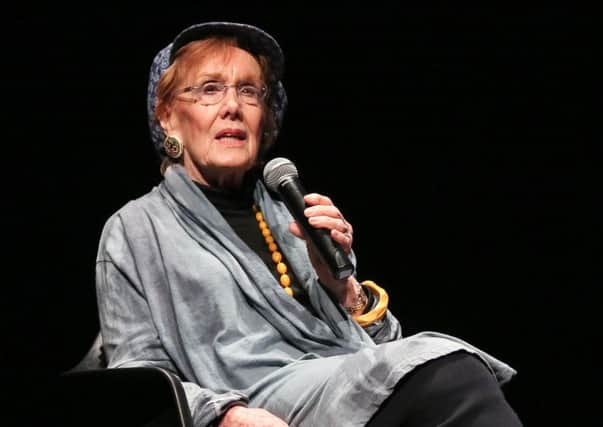Obituary: Marni Nixon, singer


Marni Nixon had starring roles in some of the greatest film musicals ever made. Her voice could move audiences to tears and she sang the lead in not one but two Best Picture Oscar-winners of the early 1960s. But no one was ever meant to know.
As far as audiences were concerned that was Natalie Wood up there on the big screen, singing her heart out as Maria, the star-crossed young lover, in West Side Story (1961), and that was Audrey Hepburn turning from a “loverly” cockney girl into a refined gentlewoman in another Oscar-winner My Fair Lady (1964). But it was Nixon singing on both occasions.
Advertisement
Hide AdAdvertisement
Hide AdShe also provided the singing voice for the Scottish actress Deborah Kerr in the film version of Rodgers and Hammerstein’s The King and I (1956), but she received no credit on the film or even the soundtrack album. She even provided a few high notes on Marilyn Monroe’s song Diamonds are a Girl’s Best Friend in Gentlemen Prefer Blondes (1953).
“I allowed all these actresses to dub their bodies to my voice,” Nixon joked years later. But she was contractually sworn to secrecy about her contributions at the time. She was one of the most successful singers in Hollywood, while at the same time remaining curiously unsung.
She was top of the studios’ want list whenever they needed someone to provide a singing voice for a Hollywood star. But she would probably have dropped off the list altogether if she had gone public about it when the films were made. “They would have run me out of town,” she said.
It was common practice to cast big stars in musicals and then hire “ghost singers” to dub their singing voices. In more recent times the likes of Ewan McGregor and Nicole Kidman in Moulin Rouge! (2001) and Meryl Streep and James Corden in Into the Woods (2014) have sung their own parts, sometimes providing in character what they might lack in technique.
Nixon worked closely with Deborah Kerr on The King and I. Kerr was nominated for an Oscar, her co-star Yul Brynner won one and Nixon received $420 as payment for her services, along with profuse thanks from her body double, though some stars were less appreciative.
Natalie Wood recorded the songs for West Side Story herself and thought Nixon had been recruited only to provide elusive high notes. It came as a shock that Wood had been completely replaced on the soundtrack, with Nixon singing such classics as Tonight and Somewhere. The only thing that remained of Wood on the soundtrack was her name.
“I heard later that Natalie Wood was very upset and felt betrayed by the powers that be,” Nixon said. Nixon was not entitled to any royalties from the soundtrack album, which sold millions of copies, but composer Leonard Bernstein gave her a percentage of his.
Audrey Hepburn had previously recorded Moon River for Breakfast at Tiffany’s (1961). It was a song for which her delicate voice was perfectly suited. But, like Wood, she struggled with the range demanded in a full-scale musical and Nixon was brought in. Hepburn accepted the decision and even gave Nixon a lift to work in the mornings.
Advertisement
Hide AdAdvertisement
Hide AdNixon called her 2006 memoirs I Could Have Sung All Night, in reference to one of the most popular songs in My Fair Lady, which was called I Could Have Danced All Night.
In 1965 Nixon appeared on screen as a nun in another Oscar-winner – The Sound of Music, along with Julie Andrews, to whom she bore a definite resemblance. Her contributions were beginning to become more widely known, but by the late 1960s the big film musical had peaked and Nixon returned to her career of a concert singer. She appeared in opera and worked with Stravinsky and Andre Previn.
She was born Margaret Nixon McEathron in 1930 in Altadena, near Los Angeles. The name Marni was a combination of the first syllable from each of her two forenames and she changed her surname because at school children had called her MacEarthworm. She began learning violin at about the age of four.
She was also a child actress, with small roles in several forgotten Hollywood movies, and a gifted singer from an early age. She had several illustrious teachers and appeared as a vocal soloist with Los Angeles Philharmonic Orchestra, performing Carl Orff’s Carmina Burana, when she was only 17.
Big-budget adaptations of hit Broadway musicals became very popular in the late 1950s and early 1960s, attracting huge audiences and for a while dominating the Oscars.
The scale of her job on The King and I and working so closely with Deborah Kerr presented Nixon with a whole new challenge.
“I was brought in and had to follow along with her, getting her diction and acting style,” she said. “She in turn would study how I looked when I hit the high notes.”
When the “ghost singer” work began to dry up, Nixon returned to concerts and recording. She provided the singing voice for the grandmother in the 1998 animated film Mulan and appeared in Follies and Nine on Broadway in the early 2000s.
Advertisement
Hide AdAdvertisement
Hide AdHer first husband was the composer Ernest Gold, who won an Oscar for the music for Exodus. They had two daughters, who survive her, and a son, Andrew Gold, the singer-songwriter who had a hita with Lonely Boy and Never Let Her Slip Away in the 1970s and died in 2011.
Her first two marriages ended in divorce. She married for a third time to flautist Albert Block, who died last year.